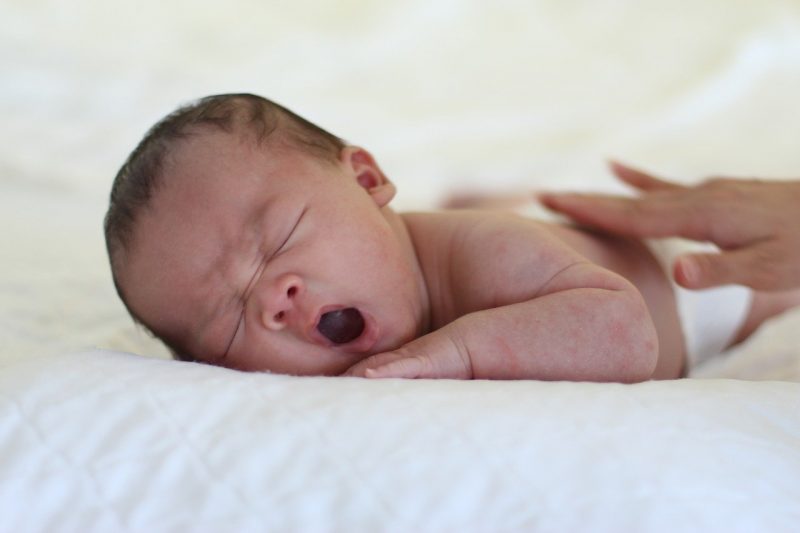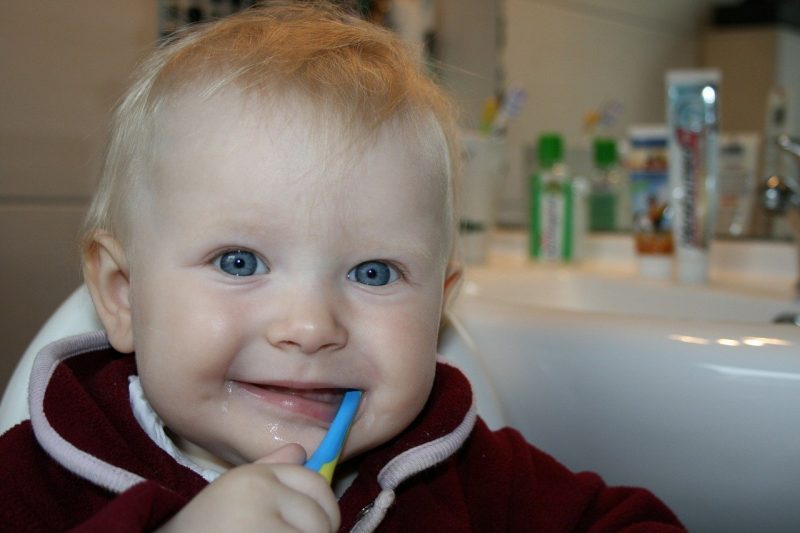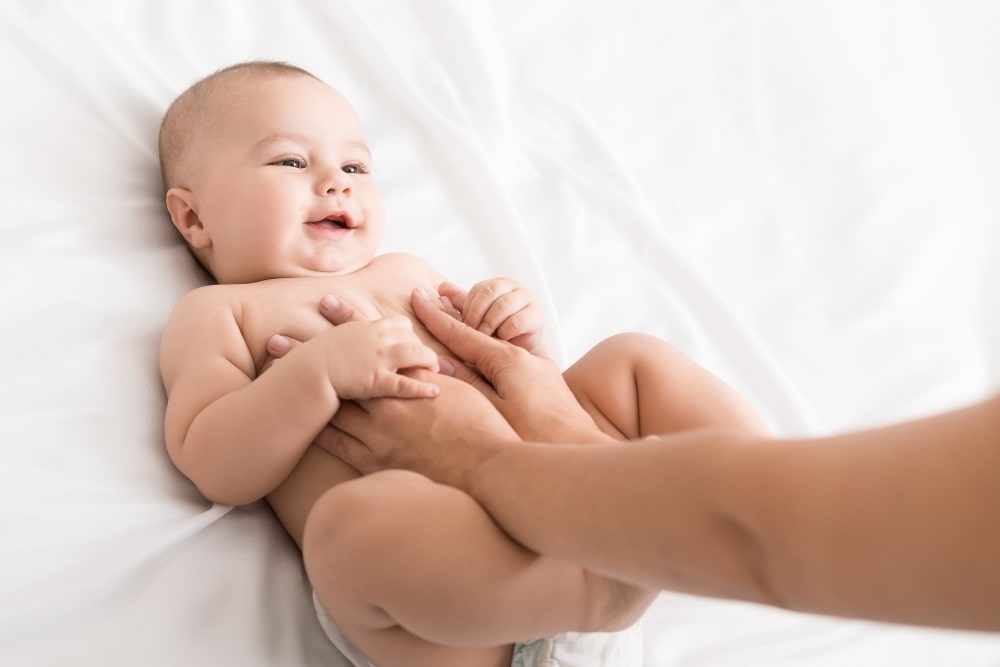Babies don’t have the means to communicate except for their crying. When they’re tired, they cry. Hungry? More crying. Bored or lonely? They will wail tears of frustration.
This can make it a bit difficult to determine exactly what it is that is making your little one cry. There are quite a few reasons that your baby might be happy one minute and have crocodile tears that break your heart the next, though.
1. Hunger Will Make A Baby Suddenly Fussy
If your little one was a happy baby enticed with a toy less than a minute ago but is suddenly screaming, it could be because they’re hungry.
Little ones go from a little hungry to feeling as though they’re starving in a matter of minutes. This is because they’re so small that formula makes its way through their digestive system quicker than food does through ours.
Babies will also scream if they aren’t getting enough to eat. As babies get older, they eat more. However, there’s no signal that tells us they are ready to eat more except that they are hungry.
If your little one used to eat every three hours, suddenly they will start screaming to eat at two and a half hours.
It can take a little bit to figure out that they simply need more ounces per feeding. Babies will also eat more when they are going through a growth spurt.
If it’s close to your baby’s feeding time, you can try feeding them another bottle. If your baby doesn’t eat when they’re not hungry, they won’t take the bottle if something else is wrong.
Other signs to look for that can tell you babies are hungry are:
- A baby will move it’s head back and forth to look for a nipple
- Hungry babies will suck on their hands or their fists
- Babies that are hungry are more alert
- Older babies might smack their lips
By the time a baby is crying because they’re hungry, they’re usually past these common hunger signs.
Crying might make it harder for them to latch on to a breast or nipple, which can make it seem like they are not hungry. If you noticed previous hunger signs, try a few more times, and see if your little one latches on.
2. Being Tired Will Make A Baby Fussy All Day
If your little one doesn’t seem to stop crying, they might be tired. A newborn baby will need approximately 14-17 hours of sleep every day.
View in gallery
This will usually be broken up throughout the day and night. On average, babies will only be awake for 1 or 1 1/2 hours at a time. If your little one has been up for longer than that, it could mean that they are tired.
When babies get used to falling asleep in their crib or bassinet, they might have a hard time falling asleep if they’re being held. This is common in older babies, such as 6 months old, but is occasionally seen in newborn babies too.
If you’re not sure if your little one falls into this category, lay them in their safe sleeping spot (bassinet, crib, co-sleeper, etc.) and let them cry for a few. Some babies will then fall asleep on their own.
Common signs that your baby might be tired include:
- Yawning
- Rubbing their eyes, or at least trying to
- Balling up their fists
- Rubbing or pulling on their ears
- Older babies might play with their hair
- A hard time focusing. Their eyes might go cross-eyed or appear to have a “glazed eye” look
Babies that are overtired tend to fight their sleep more than other babies do. To help them fall asleep consider swaddling them, rocking them, or letting them relax in their favorite bouncer.
Some babies fall asleep quicker when they have a vibrating bed too! Make sure that your baby has plenty of time to get rest to guarantee that they don’t get overtired.
3. Teething Will Make A Baby Fussy
Babies might start teething around six months old. Some start as early as four months, or a little sooner! Others might start late.
Regardless of when it happens, teething can instantly turn your baby into a fussy baby for days. It usually feels like it comes out of nowhere.
If your little one is teething, they’ll show certain symptoms of teething that you don’t see other times.
View in gallery
It’s important to remember that signs of teething tend to vary depending on the baby, and on how far along that little tooth is in the process. Common signs of teething to watch out for include:
- Fever
- Fussiness
- Gums appear white where the tooth is coming in
- You can see a tooth coming in
- Drooling
- ALOT of saliva
- Diarrhea
- Swollen gums
- Feeling the need to chew on things
If your baby shows any of the obvious symptoms of teething, like white gums, you can trust that they are teething. Other obvious symptoms include drooling or chewing on things.
If your baby is teething and doesn’t have something to chew on, they’ll usually chew on their hands.
How To Soothe Babies That Are Teething
When babies are teething, there are a few different ways that you can help them find relief. You can find plenty of products online, or opt for some awesome DIY home remedies to soothe your baby’s gums.
Baby Orajel
Baby Orajel works just like Orajel for adults does. You put it on your finger or a cotton swab, and then rub it on the gums. If you choose to use your finger, make sure to thoroughly wash your hands first.
[amalinkspro type=”showcase” asin=”B07DKMCDY5″ apilink=”https://www.amazon.com/dp/B07DKMCDY5?tag=mominformedcom-20&linkCode=osi&th=1&psc=1″ new-window=”true” addtocart=”false” nofollow=”true” sc-id=”4″ imgs=”LargeImage” link-imgs=”false” specs=”Benzocaine Free~~~Instant Cooling Sensation~~~For Babies 3+ Months~~~Apply to the affected area up to 4 times daily or as directed by a physician or healthcare provider~~~Sugar Free, Gluten Free, Dairy Free, and Free of Artifical Flavors” btn-color=”#ff9900″ btn-text=”Buy on Amazon” alignment=”aligncenter” hide-prime=”0″ hide-image=”0″ hide-price=”0″ hide-button=”0″ width=”750″]Orajel Baby Daytime and Nighttime Non-Medicated Cooling Gels for Teething[/amalinkspro]
Then, the medicine will numb the gums, providing almost instant relief. Keep in mind that this medicine does wear off after a couple of hours.
It’s almost important to note that the box states not to give babies this medicine more than four times a day.
While this medicine does work quite well, the FDA points out that it can cause a rare disorder in children under two. Personally, I used it with my children, and my daughter uses it with her baby.
However, that doesn’t mean that you definitely want to do the same thing. It’s important to research Orajel, the risks, and decide if it’s right for your family. This article provides an overview of the FDA’s stance on medicated teething products.
Gum Massage
Massaging your baby’s gums can instantly help them feel better. The pressure on the gums helps provide relief for gum pain due to teething.
To do this, you can use a finger toothbrush. These are plastic and slide right over the tip of your finger. Then, massage the gums in a gentle yet firm circular motion.
[amalinkspro type=”showcase” asin=”B01LZAGSIU” apilink=”https://www.amazon.com/dp/B01LZAGSIU?tag=mominformedcom-20&linkCode=osi&th=1&psc=1″ new-window=”true” addtocart=”false” nofollow=”true” sc-id=”4″ imgs=”LargeImage” link-imgs=”false” specs=”Baby toothbrush size: Height: 2.1, Diameter: 0.86~~~Toddler toothbrush packing: 6 pcs baby finger toothbrush for baby with package~~~Infant toothbrush is flexible: finger toothbrush for baby fits snugly on an adult index finger while cleaning your babys mouth~~~” btn-color=”#ff9900″ btn-text=”Buy on Amazon” alignment=”aligncenter” hide-prime=”0″ hide-image=”0″ hide-price=”0″ hide-button=”0″ width=”750″]Baby Toothbrush with Case Set (6 PCS),Finger Toothbrush for Babies[/amalinkspro]
If you don’t have a finger brush handy, and don’t have time to wait on one to be delivered, a regular toothbrush will also work well. A wet washcloth is another great idea. Get a clean washcloth wet with cold water to provide additional relief.
Infant Tylenol
Infant Tylenol can instantly provide relief for the pain. It can reduce the fever that goes hand in hand with teething, providing relief from the minor discomfort that comes with it.
Infant Tylenol can also help reduce inflammation, including when the gums are inflamed due to teething.
[amalinkspro type=”showcase” asin=”B00MK2D954″ apilink=”https://www.amazon.com/dp/B00MK2D954?tag=mominformedcom-20&linkCode=osi&th=1&psc=1″ new-window=”true” addtocart=”false” nofollow=”true” sc-id=”4″ imgs=”LargeImage” link-imgs=”false” specs=”2-fluid ounce bottle of Infants Tylenol Oral Suspension medicine to temporarily relieve minor aches and pains due to the common cold, flu, sore throat, toothache for your little one~~~The infants liquid pain reliever medicine also starts to reduce fever in as little as 15 minutes. Each 5-milliliter dose of the infants medicine contains 160 milligrams of acetaminophen, a known pain reliever and fever reducer.~~~~~~” btn-color=”#ff9900″ btn-text=”Buy on Amazon” alignment=”aligncenter” hide-prime=”0″ hide-image=”0″ hide-price=”0″ hide-button=”0″ width=”750″]Infants’ Tylenol Acetaminophen Liquid Medicine, Grape, 2 fl. oz[/amalinkspro]
Teething Toys
Teething toys are perfect for babies that are teething! They’re often easy to hold so babies can grab them, and then stick them in their mouths. Some are designed to be put in the freezer and frozen.
Other teething toys have patterns that can work to massage the gums when your baby chews on them.
Because standard teething toys are designed for the freezer, and most have gum massagers included, these are a personal favorite of mine for both my children and the grandbaby.
[amalinkspro type=”showcase” asin=”B003N9M6YI” apilink=”https://www.amazon.com/dp/B003N9M6YI?tag=mominformedcom-20&linkCode=osi&th=1&psc=1″ new-window=”true” addtocart=”false” nofollow=”true” sc-id=”4″ imgs=”LargeImage” link-imgs=”false” specs=”Multi-surface teething makes this teether perfect for assisting in the eruption of front, middle and back teeth~~~When place in the refrigerator Nubys PurICE technology provides gentle cooling on babys gums~~~Easy grip design is ideal for little hands and helps with coordination; Dual surfaced teether” btn-color=”#ff9900″ btn-text=”Buy on Amazon” alignment=”aligncenter” hide-prime=”0″ hide-image=”0″ hide-price=”0″ hide-button=”0″ width=”750″]Nuby Ice Gel Teether Keys[/amalinkspro]
Cold Helps Provide Relief For Teething Pain
When considering what can help your little one with teething pain, always remember that cold things help.
Putting gum massagers, teething toys, or washcloths in the freezer before giving them to your baby will provide more relief than teething toys that aren’t put in the freezer will.
4. Gas Will Make A Baby Suddenly Fussy
When babies get gas, it can come on suddenly after eating. Sometimes, it will come on suddenly seemingly out of nowhere.
If your little one has gas, they can produce screams that will instantly make you scramble to find the cause of them. Slow down, and look for these signs that your baby has gas:
- Your baby’s face gets red when they cry as if they are in pain
- Baby pulls their legs up when they cry, which results in their knees being to their chest or stomach
- Baby is fussy for an hour or so a day
- The baby is not happy
- Certain positions seem to calm the baby
- Baby squirms as if they are uncomfortable
The more of these signs that your little one has, the worse the gas probably is.
How To Soothe A Baby That Has Gas
Every baby gets gas. Most babies get gas from sucking down the air in their bottles, which can easily happen.
Holding the bottle up or purchasing bottles that are designed to help prevent gas, such as Dr. Brown’s bottles, is a great way to eliminate gas in the future. However, if you have a gassy baby now, these tips will help your little one find relief.
Gas Relief Drops
Gas relief drops are a great way to provide almost instant relief. Most parents keep a bottle of these in the diaper bag in case their baby gets gas while they are in the car, etc. and other methods are not available.
These also work exceptionally well for severe cases of gas. They might not provide complete relief in severe cases, but they definitely help.
[amalinkspro type=”showcase” asin=”B00DB4N08G” apilink=”https://www.amazon.com/dp/B00DB4N08G?tag=mominformedcom-20&linkCode=osi&th=1&psc=1″ new-window=”true” addtocart=”false” nofollow=”true” sc-id=”4″ imgs=”LargeImage” link-imgs=”false” specs=”No artificial colors or fluid avors~~~No alcohol, saccharin or gluten~~~Works in minutes~~~Safe, gentle relief of gas discomf” btn-color=”#ff9900″ btn-text=”Buy on Amazon” alignment=”aligncenter” hide-prime=”0″ hide-image=”0″ hide-price=”0″ hide-button=”0″ width=”750″]Little Remedies Gas Relief Drops for Tummy’s, Natural Berry, 0.5 oz.[/amalinkspro]
Burp Your Baby
Sometimes gas comes out as a fart, and sometimes it will come out as a burp if you burp your baby.
If you think that your little one has gas, try to hold them upright and burp them. Patting them on the back can be soothing, and if babies can burp it can provide instant relief.
Massage Their Stomach
Putting pressure on their belly can instantly help with babies that have gas. Some babies will respond well to a gentle but firm stomach massage. This can help babies almost instantly feel better!
View in gallery
Lay Babies On Their Stomach Over Your Lap
When my son was a baby, he had unbelievable gas. We switched bottles, formula, etc. He still had gas. His pediatrician advised that I lay him over my lap.
In this position, his head would be in my lap with his legs on the couch beside my leg as he laid on his stomach. Essentially, his butt would be up in the air.
Laying him in this position worked wonders! Patting him on his back at the same time helped a lot too.
5. Babies Get Fussy When They Are Overstimulated
Being around a lot of noise, lights, and fun can be a blast! However, too much fun can lead to a cranky baby. Babies can get overstimulated quickly by lights and noise.
Simply taking them to run errands for hours can be overstimulating for some children.
If your little one has had a busy day, and you find your baby suddenly crying, try taking a break from the rest of the world. Hang out at home without loud music or a loud television.
If possible, create a calm environment without a lot of people. If your little one is overstimulated, they should calm down rather quickly.
6. Sudden Fussiness Could Be Due To A Sudden Change
Some babies have a harder time transitioning from one thing to another, and most babies fall into that category. If you suddenly changed routines, perfumes, formula, or anything else overnight, your little one might not like it.
Consistency makes babies feel safe, and when parents suddenly change things, no matter how small that change is, it can bother them or make them feel unsafe.
Instead of changing things all at once, implement changes to routines, formula, or anything else in small stages when possible.
7. Your Little One Might Cry Because They Are Bored
Babies only have one means of telling you things: crying. Babies often cry when they are bored or would like for you to play with them.
If your little one looks at you crying and stops when you bring out their favorite toy, it’s a sign that they are bored.
Younger babies often lack the motor skills to hold and play with toys, which means that it’s up to you when they are bored. Usually, playing with a baby when they are bored is enough to help calm them down.
View in gallery
8. Baby Crying Suddenly Can Signal That They Are Uncomfortable
When babies are uncomfortable, they cry. Some babies are sensitive to certain things, such as the feel of a specific fabric. Babies that are hot or cold will also cry.
When babies have diaper rash, they will be fussier. Skin irritations, such as eczema, will also make babies uncomfortable.
To find a solution to this, you must first figure out why your little one is uncomfortable. Then, find a solution to that problem and your little one will start feeling better.
9. Sudden Fussiness Can Signal Tummy Troubles
When your baby’s suddenly fussy, it could mean that they are having stomach troubles. Babies that have diarrhea, constipation, or an upset stomach could seem fussy suddenly.
Take a moment to think about the last time your little one had a bowel movement. Has it been watery lately? A little too watery? Did they last poop a couple of days ago, which is not normal for them?
This is one of the most common causes of fussiness in babies, and one that is often overlooked.
If your little one is constipated, contact your pediatrician to see if you can give them a little bit of apple juice that is watered down. This usually helps them poop!
10. They Don’t Like Something
Babies have their own personalities and preferences. Sometimes, babies simply don’t like things. If a baby starts to cry after you hand them a particular toy, it’s worth considering that they don’t like that toy or color.
Babies might not like bright lights or be sensitive to loud noises. If you just gave them a toy, moved them to a bouncer, etc. and they started suddenly crying, there’s a good chance that they don’t want whatever you’re trying to do right then.
In Conclusion
Babies cry because it’s the only way that they have to tell us things. If your baby is crying suddenly, it could because they are in pain from gas, bored, tired, or need a break from all the stimulation.
They could also be uncomfortable. Try these remedies to transform your little one back into the cuddly cutie pie that they used to be!






